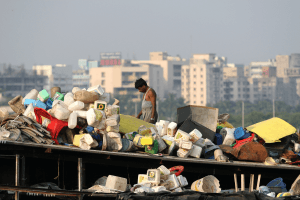
Our Community
 On the heels of a week-long trip to India and subsequent Impact Investment Exchange Asia (IIX) conference in Singapore, I returned to San Francisco inspired by extraordinary change agents who are actively building the field of impact investing. From social entrepreneurs to nonprofit leaders to activists, the grit with which these innovators are tackling poverty via market-driven solutions to health, education, and employment is truly remarkable—and offers lessons for early US efforts as well.
On the heels of a week-long trip to India and subsequent Impact Investment Exchange Asia (IIX) conference in Singapore, I returned to San Francisco inspired by extraordinary change agents who are actively building the field of impact investing. From social entrepreneurs to nonprofit leaders to activists, the grit with which these innovators are tackling poverty via market-driven solutions to health, education, and employment is truly remarkable—and offers lessons for early US efforts as well.
Destination: India! Meetings in Mumbai (Bombay) and Bangalore provided an insider’s view onto the practical matters of running a sustainable social enterprise, as well as operationalizing an impact investment strategy. In addition, the trip also laid the groundwork for Tides’ emerging (Ad)venture Philanthropy initiative. Aimed at inspiring and activating would-be social investors, the 10-day (Ad)venture Philanthropy learning journey – slated for late January 2013 – will connect the supply side of giving and investing with on-the-ground demand.
The three organizations highlighted below—all of which are a part of the (Ad)venture Philanthropy agenda in India—are at the center of a robust social sector ecosystem in India.
Dasra India
Based in Mumbai, Dasra is India’s leading strategic philanthropy foundation that brings Indian philanthropists and social entrepreneurs into a dynamic network. In a country where 800 million people live on $2 per day or less, mission-minded organizations like Dasra are playing a vital role in linking philanthropy and impact investing with successful social entrepreneurs in need of debt and equity investments to expand their enterprises. Led by Partners Deval Sanghavi and Neera Nundy, Dasra manages two initiatives that further this goal: the Indian Philanthropy Forum (IPF) and Dasra Social-Impact (DSI). While IPF works to build a community of visionary philanthropists to strategically drive social change in India around a giving circle model, Dasra Social-Impact Dasra Social Impact provides executive education to nonprofit and social enterprise leaders to strengthen their skills; it also links DSI participants to funding via the IPF.
Mother Earth
Owned and run by Dasra Social-impact alumni Neelam Chhiber, Mother Earth is a hybrid social enterprise based in Bangalore supporting livelihoods of rural producers and agricultural workers all over the country. They produce contemporary household items using raw materials and traditional craft techniques that link rural producers with markets. The pioneering work focuses on adding value to agricultural by-products and other natural fibers in terms of product diversification, design, and simplification of labor and time intensive processes. The good are then sold at six retail outlets across India. An investment from India’s leading retailer – Future Group – allowed Mother Earth to expand; plans call for Mother Earth to open 40 stores in 5 years.
Rural Shores
Rural Shores is a social enterprise that works to assimilate rural youth into the knowledge economy by bringing business process outsourcing (BPO) opportunities to rural areas. With a network of rural data centers spread across the country that currently employ more than 1,200 staff, Rural Shores manages data digitization across a wide range of industry sectors for both domestic and international clients. A winner of a 2012 Edison Award for Lifestyle and Social Impact, CEO Murali Vullaganti has already received two rounds of venture capital funding – including an investment from Lok Capital – to continue expansion.
Second stop: Singapore. At the Asia IIX Impact Forum, more than 400 individuals representing the supply, demand, and intermediary components of the impact investing landscape came together to discuss the ongoing development of the nascent field. Representatives from Rockefeller Foundation, Bank of America Merrill Lynch, Bamboo Finance, LGT Venture Philanthropy, and Monitor Group, to name a few, participated in panels alongside Tides exploring impact investing opportunities. Three themes emerged:
As Tides continues to develop new product and service solutions for the supply and demand sides of impact investing from our intermediary perch, we will keep you posted.

Read the stories and hear the voices of social change leaders fighting for justice.